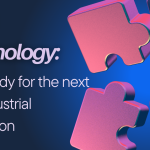Being ahead of the curve is essential in a world where technological innovation is happening at a rate that has never been seen before.As the World Economic Forum aptly acknowledged in its Future of Jobs report, we're on the cusp of a fourth industrial revolution, propelled by the convergence of various groundbreaking technologies. To thrive in this era of rapid change, businesses must not only be aware of disruptive technologies but also cultivate talent equipped to harness their full potential.
Here are ten transformative technologies that are poised to reshape the global economy by 2025:
1 Mobile Internet (Mobile icon image):
The advancement of mobile computing devices is revolutionizing the internet of things.By 2025, an additional 4.3 billion people could gain access to mobile connectivity, driving unprecedented opportunities for innovation and economic growth.
2 Artificial Intelligence (Brain icon image):
Advancements in machine learning and user interfaces are propelling artificial intelligence to new heights. Speech and gesture recognition technologies are poised to enhance productivity and streamline knowledge work, ushering in a new era of automation.
3 Virtual and Augmented Reality (AR/VR icon image):
The market for virtual and augmented reality is expected to reach $80 billion by 2025, indicating that the sector is poised for rapid expansion.As technology infrastructure evolves, an ecosystem of consumer and enterprise applications will emerge, unlocking boundless possibilities for immersive experiences.
4 Cloud Technology (Cloud icon image):
The cloud continues to revolutionize IT services and web applications, offering scalability, flexibility, and enhanced cybersecurity. As more enterprises migrate to the public cloud, the landscape of digital infrastructure is undergoing a profound transformation.
5 Internet of Things (Internet icon image):
With billions of devices connected globally, the Internet of Things is opening the door to previously unheard-of levels of automation and connection.Organizations must grapple with the challenges of monitoring and securing this vast network of interconnected devices.
6 Advanced Robotics (Robotics icon image):
Advances in robotics technologies, including artificial intelligence, machine vision, and materials science, are reshaping industries and redefining the future of work. The demand for skilled talent in robotics engineering and maintenance is poised to soar.
7 Biometric Technology (Thumbprint icon image):
Traditional passwords are on the verge of obsolescence, with biometric authentication poised to revolutionize cybersecurity. Face, voice, eye, hand, and signature identification technologies will redefine authorization services, enhancing security and convenience.
8 3D Printing (3D Printing icon image):
A new era of mass customisation and supply chain optimization is about to begin with 3D printing.With the potential to dramatically reduce costs and increase efficiency, 3D printing technologies will unlock unprecedented economic opportunities.
9 Genomics (Genomics icon image):
Genetic engineering technologies, coupled with advances in DNA sequencing and analytics, are poised to revolutionize agriculture, energy, and healthcare. By leveraging genomics, we can address global challenges and enhance human well-being.
Blockchain (Blockchain icon image):
Blockchain technology, best known for its role in virtual currencies like Bitcoin, is poised to transform various industries through streamlined, secure contracting and transacting. As commercial adoption grows, blockchain will reshape the future of finance, supply chain management, and beyond.
Wildcard: Quantum Computing:
While the application of quantum computing remains uncertain, its potential to revolutionize computing power is undeniable. With small quantum technologies projected to be commercially available within five years, businesses must prepare to leverage this game-changing technology.
As these technologies reshape industries and redefine the future of work, the importance of enterprise learning and talent development cannot be overstated. To thrive in the face of technological disruption, businesses must prioritize education and retraining programs to equip their workforce with the skills needed to navigate the fourth industrial revolution. By fostering a culture of continuous learning and adaptation, businesses can not only survive but thrive in an era of unprecedented change.









